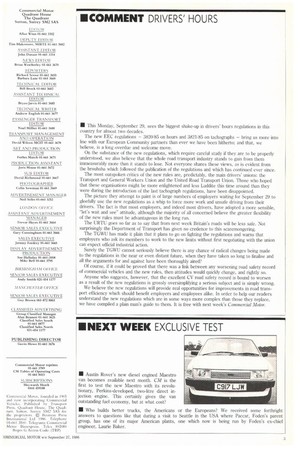• COMMENT DRIVERS' HOURS
Page 5

If you've noticed an error in this article please click here to report it so we can fix it.
• This Monday, September 29, sees the biggest shake-up in drivers' hours regulations in this country for almost two decades.
The new EEC regulations — 3820/85 on hours and 3821/85 on tachographs — bring us more into line with our European Community partners than ever we have been hitherto; and that, we believe, is a long overdue and welcome move.
On the substance of the new regulations, which require careful study if they are to be properly understood, we also believe that the whole road transport industry stands to gain from them immeasurably more than it stands to lose. Not everyone shares these views, as is evident from the brouhaha which followed the publication of the regulations and which has continued ever since.
The most outspoken critics of the new rules are, predictably, the main drivers' unions: the Transport and General Workers Union and the United Road Transport Union. Those who hoped that these organisations might be more enlightened and less Luddite this time around than they were during the introduction of the last tachograph regulations, have been disappointed.
The picture they attempt to paint is of large numbers of employers waiting for September 29 to gleefully use the new regulations as a whip to force more work and unsafe driving from their drivers. The fact is that most employers, and indeed most drivers, have adopted a more sensible, "let's wait and see" attitude, although the majority of all concerned believe the greater flexibility of the new rules must be advantageous in the long run.
The URTU goes so far as to say that from next week Britain's roads will be less safe. Not surprisingly the Department of Transport has given no credence to this scaremongering.
The TGWU has made it plain that it plans to go on fighting the regulations and warns that employers who ask its members to work to the new limits without first negotiating with the union can expect official industrial action.
Surely the TGWU cannot seriously believe there is any chance of radical changes being made to the regulations in the near or even distant future, when they have taken so long to finalise and all the arguments for and against have been thoroughly aired?
Of course, if it could be proved that there was a link between any worsening road safety record of commercial vehicles and the new rules, then attitudes would quickly change, and rightly so.
Anyone who suggests, however, that the excellent CV road safety record is bound to worsen as a result of the new regulations is grossly oversimplifying a serious subject and is simply wrong.
We believe the new regulations will provide real opportunities for improvements in road transport efficiency which should benefit employers and employees alike. In order to help our readers understand the new regulations which are in some ways more complex than those they replace, we have compiled a plain man's guide to them. It is free with next week's Commercial Motor.
















































































































